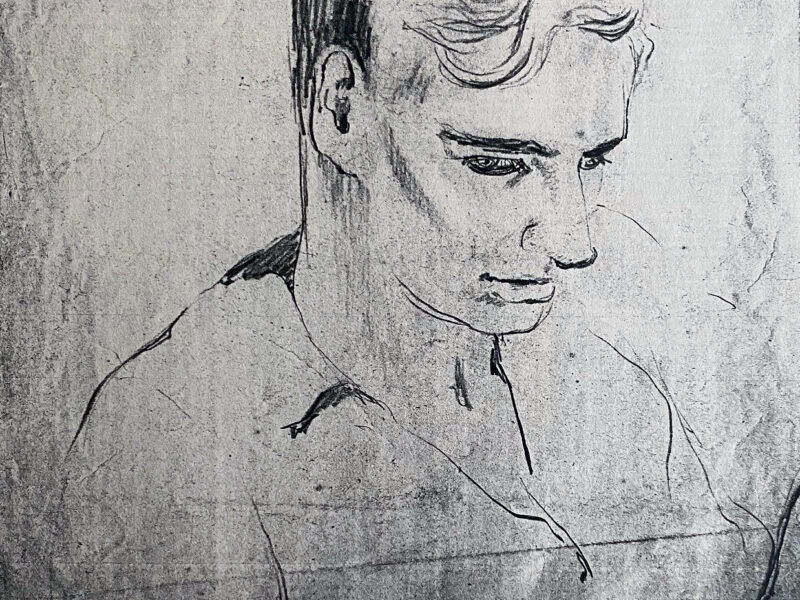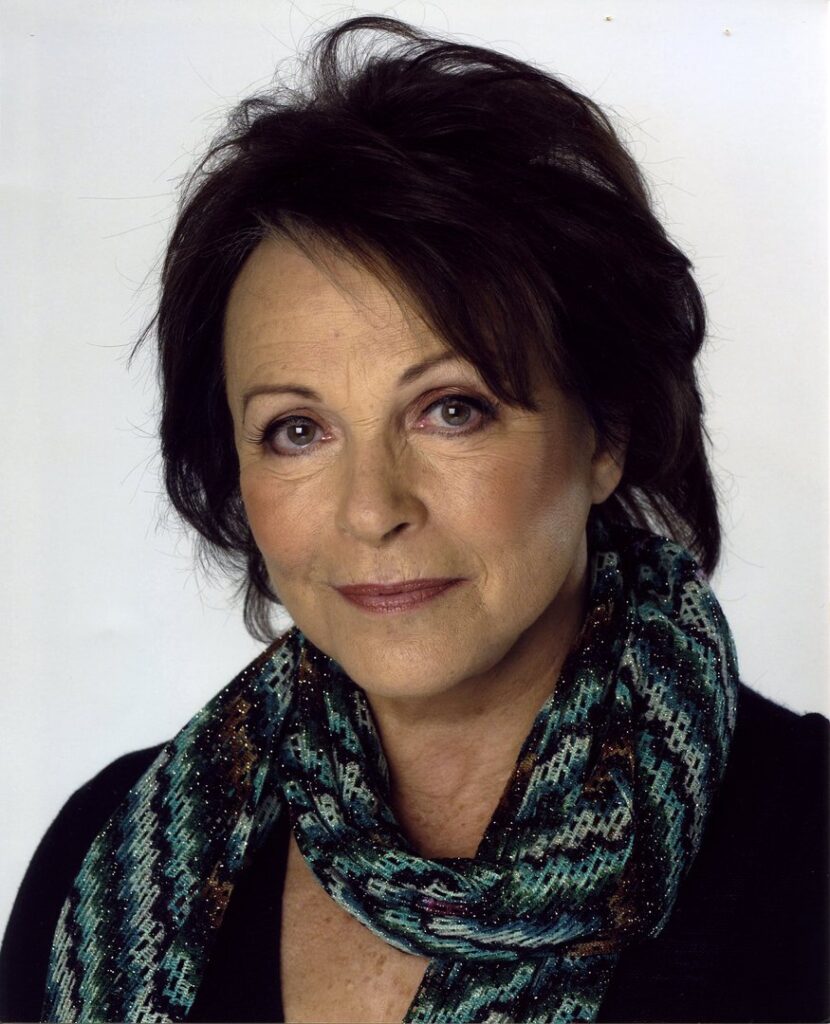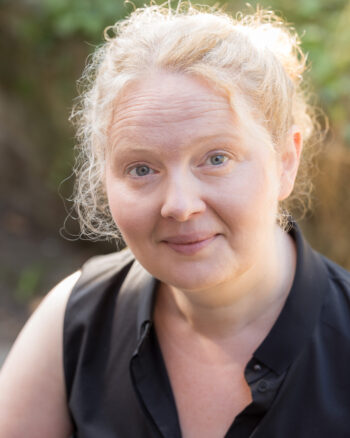Review by Simon Jenner, September 23 2025
★★★★★
Devised by Finborough Theatre’s artistic director Neil McPherson, Remember Your Lovers is an exceptional tribute to Sidney Keyes, a poet of genius dead before he was 21. Hyperbole? Listen to the hour-long podcast, available free on the Finborough’s website.
McPherson recruits a roster of actors headed by Claire Bloom no less, often several actors interleaving their voices, the whole directed by Catherine Harvey. Louise-Mai Newberry narrates Keyes’ story between poems. Recorded by the late Angus Chisholm and Catherine Harvey, there’s an atmospheric soundscape by Iain Mackness discreetly foregrounded just at strategic points (sea-wind, a trumpet, soldiers’ voices). It’s precisely what’s needed. It’s poignantly bookended by the Harpsichord Concertino by Walter Leigh (1905-42) killed at Tobruk.
The production takes its title from a poem written by Sidney Keyes (1922-43) the youngest of the war poets and first to die. Indeed he wrote it having half an hour to spare in his Past Mods at Oxford. A poem of women letting their lovers die, it startlingly begins by asking the dead to remember the living. ‘Young men, walking the open streets /Of death’s republic, remember your lovers.’ It’s the wrenched metaphysic learned from Donne and Rilke particularly, that proclaims Keyes a European poet. It was first asserted by his friend and first editor Michael Meyer (later scholar and biographer of Ibsen and Strindberg). It’s memorably voiced here, and with several actors. It’s a great opening few minutes of podcast:
When you woke grave-chilled at midnight
To pace the pavement of your bitter dream
We brought you back to bed and brought you home
From the dark antechamber of desire
Into our lust as warm as candle-flame.
Young men who lie in the carven beds of death
Remember your lovers who gave you more than dreams.
… We led you out of terror tenderly
And fooled you into peace with our soft words
And gave you all we had and let you die.
Keyes’ fluency might occasionally have led him to flourishes, but the sheer rythmic passion and imagery is also driven by what Geoffrey Hill called a “Gothic pastoral”, seen in several poems.
Indeed more than any of his contemporaries, Keyes was an internationalist, an intellectual who found a community of poets with John Heath-Stubbs (1918-2006) and Drummond Allison (1921-43). Rilke and a poem entitled ‘Paul Klee’ come as easily as a superb poem about ‘William Byrd’, ‘William Wordsworth’ or ‘Greenwich Observatory’. Keyes mixed precocity with a defiant romanticism out of kilter with the late 1930s Audenesque of contemporaries like Keith Douglas (1920-44) and Allison, his two finest contemporaries, also at Oxford and also to die months after Keyes. Keyes was though in tune with the neo-Romantic poetry of the 1940s – think Dylan Thomas, Lynette Roberts, Vernon Watkins, and later Thirties contemporaries of Thomas like George Barker and David Gascoyne. Neo-Romanticism more quickly fell out of fashion than the Audenesque and – till recently with a revival – has lasted less well. Keyes’ unique voice has been occluded with it.
But Keyes transcends his period too. Not wholly, and some work strikes rhetorical and florid attitudes. His neo-Romanticism chimes with the neo-Romantic artists of the time; and has the imagistic virtue of its defects. But many poems own a mineral toughness and bronze ring. There’s less of those poems here (Carcanet’s 2002 volume is definitive – and essential). Nevertheless some of the most memorable are chosen and what McPherson does with the work is to select many poems with voices in them: Keyes becomes a contrapuntal radio poet. It’s a startling innovation and takes the reception and understanding of Keyes forward more than any single act of restitution of this poet.
Alongside a second Keyes poem ‘The Heart’s Assurance’, ‘Remember Your Lovers’ formed part of Michal Tippett’s song cycle which took its title from that latter poem. Keyes’ lyricism naturally lent itself to setting.
Consider this brief lyric, actually entitled ‘War Poet”, again given a contrapuntal reading here:
I am the man who looked for peace and found
My own eyes barbed.
I am the man who groped for words and found
An arrow in my hand.
I am the builder whose firm walls surround
A slipping land.
When I grow sick or mad
Mock me not nor chain me;
When I reach for the wind
Cast me not down
Though my face is a burnt book
And a wasted town.
Rhetorical, yes, and when he reached for the wind Keyes could on occasion find it. But it’s also vividly imagistic, fluent and memorable. Keyes was as gifted as Douglas, Allison and Philip Larkin (1922-85), with whom he clashed. Meyer thought him the most gifted of all. The clash with Larkin had dire consequences for the direction post-war poetry took, in acts of suppression that have no place here. Yet poets from Larkin to Geoffrey Hill, whose indebtedness to all these poets, particularly Keyes he often paid homage, shows Keyes left a living tradition.
The cast weave in and out, often juxtaposed to bring out the multi-vocal counterpoint of some of the poems. Keyes wrote poems with voices that almost burst with the communal effort of the war. It was that kind of time. Keyes caught it. Having read Keyes all my life, this still strikes me more forcefully than previously, and alters my view of Keyes; and the scope of his potential. Claire Bloom, Catherine Harvey, Alexander Knox, Neil McPherson, Annabel Mullion, Louise Mai Newberry, Will de Renzy-Martin, Whoopie Van Raam.
Newberry brings in the narratives of Keyes’ early life, bereft of both his parents (his mother died when Keyes was six months old). Pausing on ‘Elegy’ written at 15 for his grandfather and one of the most precocious poems in the language, it’s not clotted. Indeed it runs as fluently and sleekly as that ‘Elegy’:
April again, and it is a year again
Since you walked out and slammed the door
Leaving us tangled in your words. Your brain
Lives in the bank-book, and your eyes look up
Laughing from the carpet on the floor:
And we still drink from your silver cup.
We pass swiftly over accounts of school at Tonbridge and Keyes’ Oxford life. It tends to focus not on friendship but Keyes’ passion for Milein Cosman and latterly Renée-Jane Scott, her flatmate. Both were Slade students evacuated to Oxford during the war. Indeed Allison was notably successful with Slade girlfriends and cheerfully less angst-ridden. Keyes was taken with Cosman, a Jewish refugee (from Dusseldorf). She embraced friendship but wasn’t in the least attracted. Keyes’ one-sided passion is slightly painful to relate but it certainly wrought much of his finest early poetry. Latterly Keyes found more happiness with Scott, but here too there are surprises.
Bloom in the performances reminds me vocally of both women, whom I met at the launch of Sidney Keyes’ Carcanet volume in 2002. The depth and inwardness of Cosman’s voice in ‘This is the Day’ (Cosman went on to marry fellow refugee, the great musicologist Hans Keller); and the quiet confidence with a touch of regality in Scott. I have to declare an interest since I visited Keyes’ half-sister Anne and my PhD focused on this group of poets. Probably the greatest authority on Keyes is Dr Sarah Smith. Who possesses a photo of herself standing next to Keyes’ grave.
There’s a considerable amount of time given over to Keyes’ last year, his training in Ulster, his embarkation leave, his romantic triangle, his brief but highly-detailed period of combat, and his long poems: ‘The Foreign Gate’ and particularly ‘The Wilderness’. Again, these are surprises, since they’re ambitious and not fully achieved. They afford a real opportunity though with their thronging voices to allow a gallimaufry of accent and difference: especially the chorus of people killed. Though I’ve listed the readers, only one or two are identifiable. It’s a collective voicing and everyone here performs with distinction including McPherson himself.
There are a few poems I’d love to have seen, but this is a surprisingly comprehensive survey of Keyes’. Beyond those mentioned ‘Sour Land’ is an early masterpiece. Too long, in its three sections, though the last is chilling. Alongside ‘Elegy’ and ‘Remember your Lover’s it forms the pinnacle of what might be called laughingly ‘early’ Keyes. Much later on those other poems like ‘Timoshenko’ are as concrete as ‘Wilderness’ is uneven in its rhythmic and anaphoric brilliance.
This project has been a labour of love and precision. And some tragedy. Sound engineer Angus Chisholm died tragically in late November 2024, which also had the effect of further delaying the publication of this remarkable podcast. In 2020 McPherson mounted a production (It Is Easy to be Dead) of the First War poet Charles Hamilton Sorley (1895-1915) a poet of similar brilliance and precocity (a well as possessing an acute political sense ahead of everyone else). In Sidney Keyes he has found a worthy counterpart in the Second War. An outstanding document.
Edited by Iain Mackness and Angus Chisholm. Assistant Direction by Erica Miller. Presented by Rhyme & Reason and Roguegunners Productions in association with the Finborough Theatre Cast.
Approximate list of poems read:
Remember Your Lovers
Elegy
Nocturne for Four Voices
Cold Comfort for Mr Meyer
Four Postures of Death: Death and the Young Girl
Europe’s Prisoners
Poem for Milein Cosman
The Gardener: Sonnet i.m. The Lady Elisabeth Hastings
The Mad Lady and the Proud Talker
North Sea
A Letter From Tartary
This is the Day (Bloom)
The Foreign Gate
The Doubtful Season
Not Chosen
The Foreign Gate
Claire Bloom and Catherine Harvey. Photo Credit Finborough Theatre




